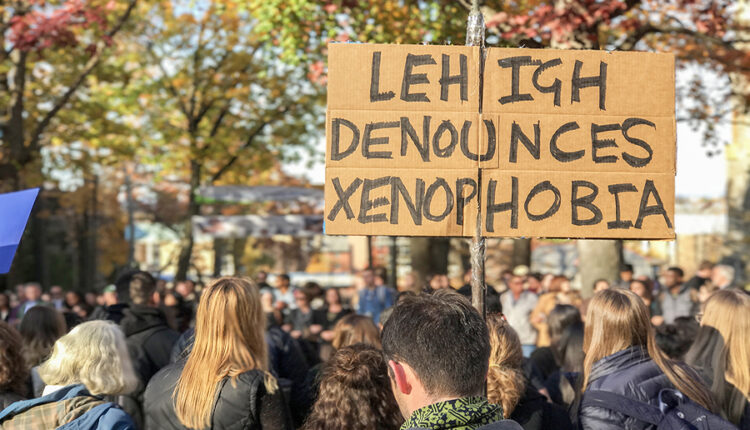Lehigh reacts to hate against Asian Americans
Anti-Asian stereotypes and hate crimes have been around in the US for decades, but they have increased and gained national attention after the COVID-19 pandemic.
NBC News Hate crimes against Asian Americans increased nearly 150 percent in 2020 and occurred primarily in large cities like New York and California.
A Stop the AAPI Hate National Report Pennsylvania was ranked fifth in the country for hate crimes against Asian Americans.
Members of the Lehigh community have felt discouraged by these acts and have worked to raise awareness on these issues.
Kelly Nguyen, 21, of Vietnamese descent, said the increase in attacks against Asian Americans was demoralizing.
She said when the coronavirus first hit the US, people were incessantly making fun of Asians.
In February 2020, an exchange university from Japan visited Lehigh and Nguyen gave them a tour of Philadelphia. They went to local stores and Nguyen remembers people who had an “oh no” reaction when they saw the Asian students.
“It doesn’t make sense to me to attack a racial group just because of a pandemic because we were mostly here when it all broke out,” Nguyen said. “We have nothing to do with the disease. It’s irrational, but I think people wanted to vent their anger somewhere. ”
Tiffany Pang, ’22, said incidents of hate crimes against Asian Americans were on the news near home. She said she feared for her family, especially her grandparents, who are more prone to these crimes.
“It is very sad to see that people are so willing to harm someone when they have done absolutely nothing,” said Pang. “They’ve been there all their lives, they’ve been in the neighborhood and they haven’t done anything to cause harm.”
Kiri Lee, director of the Asian Studies Program, said she had been afraid of the pandemic for about a year and said these were not just isolated cases. Lee believes this has “been boiling for a long time”.
Students believe the university hasn’t done enough to support the Asian American community in Lehigh outside of the email they sent. You are motivated to raise awareness of this problem.
Wei Ngai, 22, media chairwoman for the Society of Asian Scientists and Engineers, said she thinks the email Lehigh sent to Asian haters didn’t get as much resonance and didn’t really talk about it on campus.
“Lehigh is obviously a safe place, but they don’t really talk about it,” she said. “I think it’s implied it’s a safe space, but we don’t really know or other people may not understand.”
Nguyen said she was not a fit for Lehigh before the pandemic because she was a minority in a predominantly white institution.
She said she doesn’t think this school has gotten any safer since the pandemic started last year.
“I’ll be more careful when I get past a large group,” said Nguyen. “But if I just pass people casually, I’m not so worried.”
Jisu Choi, 21, president of the Asian Cultural Society, said she wasn’t sure what was available for students struggling during this time.
“I think only within the community is any contact made as an ally or just a friend honestly valued and shown to other Asian communities that they are there for them and are aware of the situation,” she said. “I think that speaks volumes for a lot of people.”
The Asian Cultural Society (ACS) worked with Southeast Asia in Lehigh, Chinese students and scholars, the Society of Asian Scientists and Engineers, and the Student Senate’s Diversity and Inclusion Committee. On April 15th, a Zoom discussion entitled “Addressing AAPI Hate” was held under the direction of Professor Dongning Wang from the Asian Studies Department.
Choi said the intent of the event is to give students the space to share their experiences and feelings, and to raise awareness of AAPI hatred.
“While the negativity is difficult to focus on and talk about, it is important and that is what a lot of our efforts focus on,” said Choi.
ACS is also running a fundraiser that runs through April 30thwhere people can donate to the Venmo handle @ lehigh-acs. All earnings are sent to Asian Americans promote justice, an organization that advocates the civil rights of Asian Americans.
Nguyen said opening a dialogue on the issue would help a lot and believes these incidents occur because certain people do not view Asians as part of the community and instead view them as “foreigners”.
Lee said this is a complex issue as there is even some hatred within minority groups.
She said that in order to have a unified voice, minority groups need to communicate with one another, be educated and have these awkward conversations. But she hopes this will encourage more people to talk about it.
“I am confident that we are taking very slow but steady steps towards (a) more inclusive society,” said Lee.
Choi said it was heartbreaking to see news and reports of violence against members of the AAPI community and people who do nothing about it. She said the solution to this problem begins by engaging in these conversations and shouting out these injustices, rather than being bystanders.
“I think, especially in the Lehigh Church, we’re just a close knit community. I would hope it wouldn’t happen here, but in any case of racism or violence against a group, I would hope that people will take care of each other and defend what is right, ”she said.



Comments are closed.